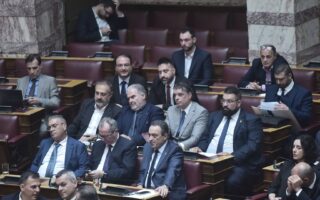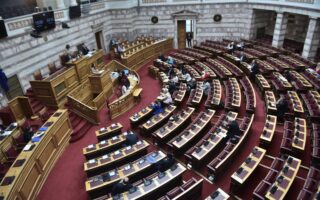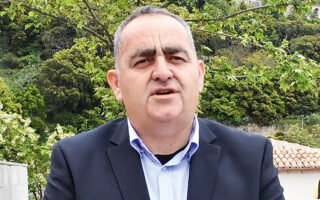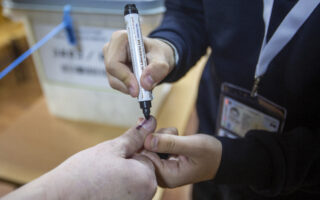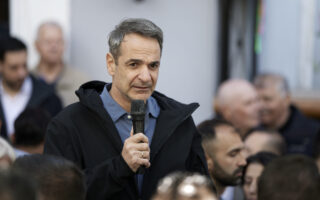Nektaria Stamouli, the deputy editor in chief of Kathimerini’s English Edition and Politico’s Eastern Mediterranean correspondent, joins Thanos Davelis to look at Wednesday’s election in North Macedonia, and its broader implications for the country’s relations with its neighbors and its EU aspirations.
ELECTIONS
The email addresses of thousands of Greek voters abroad were leaked between May and June 2023, an Interior Ministry internal audit has found.
Opposition leader Stefanos Kasselakis has reaffirmed his belief that his SYRIZA party will secure the top position in the forthcoming European Parliament elections in June.
North Macedonian presidential candidate Gordana Siljanovska-Davkova held a big lead over incumbent Stevo Pendarovski with votes counted from 99.03% of polling stations on Thursday, but both were short of the 50% backing needed to win outright.
Greece’s Supreme Court ruled on Wednesday that the far-right party Spartiates (Spartans) will be excluded from the upcoming European parliament elections.
Voters in North Macedonia head to the polls on Wednesday for the first round of presidential elections, in a test vote that could define the country’s EU perspective.
Leftist party SYRIZA seems to be winning the battle for second place from socialist PASOK while ruling conservatives New Democracy maintain a steady lead, according to an opinion poll for Action 24 TV ahead of European elections in June.
Recent opinion polls all point toward certain conclusions. The ruling New Democracy party is undergoing a decline, albeit not a steep one. This decline is evident both in terms of voting intentions and other qualitative indicators. However, despite this erosion, the party still maintains a considerable lead. In fact, data from polls regarding voting intentions […]
New Democracy’s decision to nominate Fredi Beleri, the imprisoned mayor of Himare, as a candidate for the European Parliament aims to highlight Albania’s violation of the rule of law as a European concern.
Voters go to the polls in North Macedonia this week for the first round of the presidential election — the seventh such vote since the small landlocked Balkan country gained independence from the former Yugoslavia in 1991.
More than 114,200 voters have registered for mail-in balloting in the June 9 European Parliament elections, surpassing last year’s turnout from abroad, according to Greece’s Interior Ministry.
The race for the European elections dominates the political scene after parties unveiled their roster of candidates last week. Political leaders are crisscrossing the country, aiming to mobilize voters seven weeks before the ballot.
Residents of four Serb-majority municipalities on Sunday overwhelmingly boycotted a vote on removing their ethnic Albanian mayors from office following last year’s mayoral elections.
Government officials have developed a set of five tests to determine whether the June 9 European Parliament elections will be a success or failure.
Residents of four Serb-majority municipalities are casting their votes Sunday on removing their ethnic Albanian mayors from office following last year’s mayoral elections, overwhelmingly boycotted by the Serb minority.
Prime Minister Kyriakos Mitsotakis urged Greek voters to hand candidates on ruling New Democracy’s party ticket a comfortable majority in the European Parliament elections this June.




